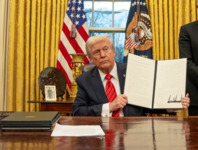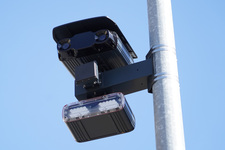 |
| Angelika/Mike Schilli |
|
Angelika We already know that you are eagerly waiting to hear how things are going for us in Trumphausen. As expected, there is such a mess and chaos that it's hard to keep up. Tariffs up and down. Stock market up and down. Visas are revoked and then reinstated. People in government agencies are fired and then rehired because it turns out that certain positions cannot be left vacant. The speed at which changes are being introduced and pushed through with brute force is surprising and surely intentional, as so many things are happening simultaneously that even seasoned journalists and political observers can't keep up. Meanwhile, as an ordinary citizen, you still have to manage your daily life.
Through the German press, you are surely quite well informed about what is currently happening in the USA, but I wanted to shed light on particular processes that I have long considered a major problem. The USA claims to be a solid democracy with a firm separation of powers, where all three branches--namely the executive, legislative, and judicial--are equal, independent, and subject to mutual control ("checks and balances"). However, there are some very large loopholes that undermine this system and have not been closed so far because everyone has relied on the assumption that no one would ruthlessly exploit these loopholes.
As one of the largest and, in my opinion, most undemocratic excesses I see is governing by decrees, so-called "Executive Orders." These are presidential directives that come into effect without the approval of Congress--as an instrument originally intended to ensure the efficiency of the executive branch, but today increasingly used as a tool to bypass the legislature. Although all presidents have used this method so far, Donald Trump is really taking it to the extreme in his second term, even though he has a - albeit narrow - majority of his Republican Party in both houses. By the way, Joe Biden signed 162 decrees during his term, Barack Obama signed 277 in eight years, and Bill Clinton issued 364 in the same eight-year period. Donald Trump issued 220 Executive Orders in his first term--and in his second term, he is already at 103. Franklin Roosevelt holds the record so far with an incredible 3,721 executive orders, including 2,023 between 1937 and 1945 alone — that is, during World War II.
In my opinion, decrees should only be used in absolute emergencies, such as a natural disaster or pandemic, to allow for swift action. Instead, democratic processes are being undermined to avoid the effort of passing laws. Interestingly, the term "Executive Order" does not appear in the American Constitution. The legal basis is usually Article II, which grants the President executive power--with the obligation to "ensure that the laws are faithfully executed," although this is a very vague formulation. Decrees must not violate existing laws and are not considered laws themselves. This leads to what we are currently experiencing. There is an increase in lawsuits challenging the legality of these decrees. And, since decrees are not laws, any new president can immediately revoke them, which happens regularly.
Another problem I see is with unrestricted pardons that a president can issue with a stroke of a pen. This should only happen in absolute exceptional cases. However, it has become customary for presidents to quickly pardon various individuals just before the end of their term. Often, humanitarian considerations are not the main focus, but rather their own political or familial connections. For example, Bill Clinton pardoned Marc Rich in 2001, who had fled to avoid prosecution for tax evasion and fraud. His wife had donated large sums to the Democratic Party and Clinton's library. Gerald Ford pardoned Richard Nixon in 1974 for possible crimes during his presidency, after Nixon resigned due to the Watergate scandal. I was particularly disappointed that Joe Biden pardoned his son Hunter Biden, even though he had previously insisted that he would never consider doing so. I also find it absolutely absurd that he pardoned some family members prophylactically, even though there were no convictions. It seems no one has integrity anymore. Everyone looks out for themselves and justifies their own misconduct with that of others. Trump then issued blanket pardons to all those convicted for storming the Capitol on January 6, without distinguishing who had committed acts of violence. Some of those pardoned are already back in prison for new offenses.
The American Constitution grants the President extensive powers regarding pardons in Article II, Section 2: "The President shall have the power to grant reprieves and pardons for offenses against the United States, except in cases of impeachment." What does this mean exactly? The President can grant full pardons, commutations, and reprieves without needing the approval of Congress or the courts. However, these pardons only apply to federal offenses and not to crimes at the state level, for which the individual governors of the states are in charge. As mentioned, impeachment cases are also excluded.
The Supreme Court then made a consequential ruling in July 2024 regarding the criminal immunity of the President. The court decided by a vote of 6 to 3 that a (former) President enjoys at least a presumed immunity for actions related to their official duties. This means that prosecution is only possible if it is proven that the charge does not impair the constitutional function of the President. For certain areas, such as the appointment of officials or the exercise of the pardon power, there is even absolute immunity, meaning the President cannot be criminally prosecuted for these actions at all. There is no immunity for private and non-official actions. Therefore, in these cases, courts must first determine whether the matters are official or private.
And then, in a modern democracy, perhaps care should be taken to ensure that ancient laws that are still officially in force are not suddenly dug up. For example, the Trump administration is currently basing deportations to El Salvador on the Alien Enemies Act of 1798, which allows the president to detain or deport citizens of so-called enemy nations without a court trial during a state of war. The application of the law was justified by declaring the Venezuelan gang "Tren de Aragua," which operates on American soil, as a hostile entity.
I'm waiting for us to maybe hear something from the members of Congress every now and then. There's really almost complete silence. Do they not want to govern anymore? The opposition hasn't reorganized yet either, and the Democratic Party is still licking its wounds and coming up with old, outdated ideas. Time is running out, let's get going.












